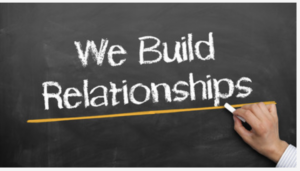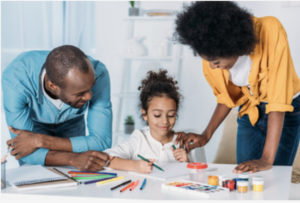- Home
- LP Courses
- Social Emotional Learning (SEL)
- “Less Talk More SEL” Toolkit
1.2 How Can I Identify Relationship Skills?
Despite how necessary these skills are, they’re rarely taught in professional or educational institutions.
Relationship skills were introduced by many of our parents or guardians. They would tell us to “be respectful” or “use your words” but then you grow up and have to learn through trial and error.
I want to teach you 3 key skills that will make you grow better with your relationships.
 3 Key Skills
3 Key Skills
- Communication: One of the most basic forms of human interaction is through verbal and non-verbal communication. Be aware of your audience when choosing your words since certain situations can call for different phrasing.
For example, you answer differently when your boss asks how your day is going than when your best friend does. It is best to be aware of how you would want to be addressed in a personal versus professional setting, but to also be aware of how your audience may feel as well.
I’ve called myself a dot connector for years. Many of my deals in my business come from building healthy, genuine and authentic relationships. This comes from communication. That’s a big piece of relationships that we are missing, because we forget to live in the moment and life is so busy busy! We don’t take time to be transparent and build with the people around us. Make sure you are engaged in conversations and people feel like they can communicate with you.
Relationships skills can help get you a job, a new partner, mend broken relationships and grow financially. It’s all about how you grow them, and social engagement is a key factor.
- Social engagement: The best way to improve social engagement is to be a tad bit more attentive to the group you are interacting with, whether you are the audience or speaker. In either case, it is good to be aware of things like non-verbal cues. Is your audience on their phones? Is the speaker fidgeting or pausing in unexpected places? It is important to give a speaker your attention, even if you don’t think you “need” to listen to them. If you are currently preoccupied with something that needs to be handled in a timely manner, then you could politely excuse yourself until you are available to be fully attentive.
If you are in a one on one discussion, it is very easy to detect when a person is not engaged. Self reflect to think of times when you have been the person not listening or the person not being heard. How did it make you feel?
- Relationship building: Sometimes people prioritize certain relationships or relationships with certain people over others. This is a personal decision, but it can cause other relationships to fall by the wayside. If you’re inte
 racting with someone, be it a family member, friend or coworker, it’s important to cultivate these relationships to avoid miscommunication or conflict. One popular technique is quality time; asking people small things about their personality such as likes and dislikes which allows you to learn about the person you’re building a relationship with. You can also ask them how they feel about certain experiences that happen within your relationship. Some people are not completely open with personal information, so this may not be the best option for all people. Instead, you could spend time with them, go to events that involve common interests and the like.
racting with someone, be it a family member, friend or coworker, it’s important to cultivate these relationships to avoid miscommunication or conflict. One popular technique is quality time; asking people small things about their personality such as likes and dislikes which allows you to learn about the person you’re building a relationship with. You can also ask them how they feel about certain experiences that happen within your relationship. Some people are not completely open with personal information, so this may not be the best option for all people. Instead, you could spend time with them, go to events that involve common interests and the like.
You have heard it stated for engaged or married couples to name their favorite color, or favorite food, as a measurement to how well they know each other. Think about how many people would get your questions correct, and then why. Use the list of valuable relationships from above.
